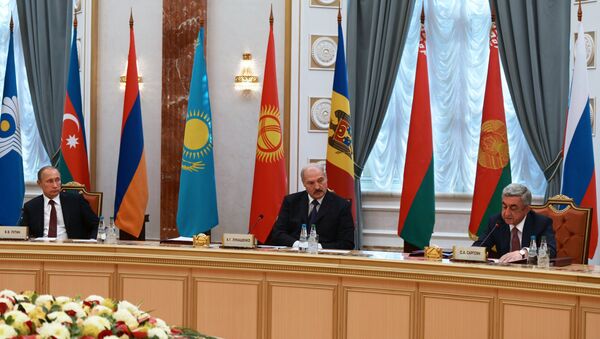MOSCOW, October 10 (RIA Novosti) – The summit in Minsk of the presidents of the countries of the Commonwealth of Independent States (CIS), a loose cluster of 11 former Soviet constituent republics, was doomed to attract attention; Ukrainian President Petro Poroshenko was conspicuously absent. The head of the Commonwealth’s second-most populous member state preferred to visit the Italian city of Milan instead.
The presidents, quite predictably, saw Poroshenko’s move as a snub; two of them, Alexander Lukashenko of Belarus and Islam Karimov of Uzbekistan, personally scolded Poroshenko for failing to respect his neighbors and for his heavy-handed approach to the war on his own territory. The fact that Poroshenko was criticized not by Russia’s Vladimir Putin, but by two of Russia’s NEIGHBORS, calls into question the main narrative of the Western press regarding the war in Ukraine and the way it is viewed by other post-Soviet states. During the past six months or more, the Western newspapers have been full of reports about other post-Soviet countries, especially ones with sizable Russian minorities, being all jittery because of the possibility of Russian “aggression” under the pretext of protecting these minorities.
The problem of possible new Russian “aggression,” however, was nowhere to be seen at the summit in Minsk. Uzbekistan’s Islam Karimov, whose country also has a Russian minority, lashed out not at Putin, but at Poroshenko. “If Mr. Poroshenko had not missed the opportunity to meet us and had provided his vision of the events [in Ukraine], this would make the situation a lot more clear to us,” Karimov said at the plenary session of the CIS summit. “Who among us have had the opportunity to see Mr. Poroshenko face to face recently? Very few. But he found time to visit Brussels in Belgium several times, as well as several other countries, which I would not like to name,” Karimov said, clearly referring to Poroshenko’s meetings with the anti-Russian leaders of several EU countries, as well as the US and Canada.
President Alexander Lukashenko, the host of the summit in the Belarusian capital Minsk, was almost equally caustic. “If the problems of Ukraine – economic ones, political ones, etc. — can better be resolved in Milan or Berlin, why do you [Mr. Poroshenko] need to ask for our help? Obviously, you need to solve these problems in Milan and Berlin,” Lukashenko said, clearly referring to Poroshenko’s recent suggestion that the CIS countries “participate” in the reconstruction of war-torn Donbass.
In fact, the clearly pro-Russian (and anti-Maidan) leanings of the CIS summit in Minsk shows where the leaders see the real (and not imagined) dangers for their countries. These dangers do not include Russian “aggression”, but rather internal destabilization, poverty and the possibility of violent Western-sponsored “regime changes.” If anyone is “isolated” (the most frequently used word in the Western discourse on Russia), it is not Russia, but rather Poroshenko’s regime – at least, inside the Commonwealth of Independent States (of which Ukraine formally remains a member).
Here are the facts which The Washington Post and other Western media, who love to talk about Russia’s “isolation,” simply do not notice. At the recent Caspian summit in Astrakhan, Russia agreed with its three CIS partners (Kazakhstan, Azerbaijan and Turkmenistan) on the future legal status of the Caspian Sea – a thorny issue the four countries hadn’t been able to resolve for 20 years. Before the end of the year, Russia, Belarus and Kazakhstan will all ratify the agreement on the creation of the Eurasian Economic Union, a document signed in Astana last May which will create a joint economic space linking Russia, Belarus, Kazakhstan and in the near future – also Kyrgyzstan and Armenia.
Economically and technologically, members of the Eurasian Economic Union are doing better than the pro-EU Ukraine.
This year Kazakhstan is going to show 4 percent economic growth (the European Bank for the Reconstruction and Development expected Kazakhstan to post 5.5 percent growth, but the forecast was downgraded in May because of the EU’s sanctions against Russia, which also adversely affected Kazakhstan). Russia’s economy is expected to grow 1.3 percent.
“This is not much, but this is the same result as Poland, and no one is assessing the Polish situation with economic growth as tragic,” commented Ben Aris, the head of Business New Europe – a center for the intellectual analysis of economic developments among the former members of the Soviet bloc. “And certainly, this is a better result than in Ukraine.”
A recent Global Forum on e-government held in Astana confirmed Kazakhstan’s rating as the 28th country in the world in terms of Internet services for the population. For some people, this result is a much greater reason for joy than the “revolution” on Maidan, with its corpses, charred buildings and ruined relations with Russia.
The views expressed in this article are solely those of the author and do not reflect the official position of Sputnik.




